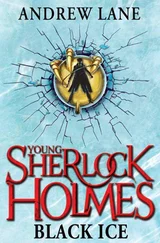Andrew Lane - Red Leech
Здесь есть возможность читать онлайн «Andrew Lane - Red Leech» весь текст электронной книги совершенно бесплатно (целиком полную версию без сокращений). В некоторых случаях можно слушать аудио, скачать через торрент в формате fb2 и присутствует краткое содержание. Город: 978-0330511995, Год выпуска: 2010, Издательство: Macmillan Children's Books, Жанр: Детектив, Детские остросюжетные, на английском языке. Описание произведения, (предисловие) а так же отзывы посетителей доступны на портале библиотеки ЛибКат.
- Название:Red Leech
- Автор:
- Издательство:Macmillan Children's Books
- Жанр:
- Год:2010
- Город:978-0330511995
- ISBN:нет данных
- Рейтинг книги:5 / 5. Голосов: 1
-
Избранное:Добавить в избранное
- Отзывы:
-
Ваша оценка:
- 100
- 1
- 2
- 3
- 4
- 5
Red Leech: краткое содержание, описание и аннотация
Предлагаем к чтению аннотацию, описание, краткое содержание или предисловие (зависит от того, что написал сам автор книги «Red Leech»). Если вы не нашли необходимую информацию о книге — напишите в комментариях, мы постараемся отыскать её.
Red Leech — читать онлайн бесплатно полную книгу (весь текст) целиком
Ниже представлен текст книги, разбитый по страницам. Система сохранения места последней прочитанной страницы, позволяет с удобством читать онлайн бесплатно книгу «Red Leech», без необходимости каждый раз заново искать на чём Вы остановились. Поставьте закладку, и сможете в любой момент перейти на страницу, на которой закончили чтение.
Интервал:
Закладка:
At the back of the boat, a narrow stairway led down into the depths of the ship. Roughly dressed men hung around the top of the stairs smoking and casting glances forward at the better dressed passengers. Sherlock guessed these were the steerage passengers, crammed into unsanitary and cramped conditions below decks, sleeping in rough hammocks or on benches, but paying much less for their tickets. People looking to start a new life in America, rather than travellers on business or pleasure as the First and Second Class passengers mainly appeared to be.
He sensed a presence beside him. Before he turned, he knew that it was Virginia.
“How’s your cabin?” he asked.
“Better than I had on the way to England,” she replied. “Father will tell you that the food and the accommodation were better, but don’t let him fool you. We weren’t travelling steerage, but we weren’t First Class either, and just because it was an American ship instead of a British ship don’t automatically make it better.”
“What about your companion?”
“She’s an elderly widow heading out to join her son, who moved to New York five years ago. She’s got a maid in the servants’ area, an’ she’s planning to start readin’ the Bible now an’ finishin’ when we get to New York. Good luck to her, I say”
“Do you want to take a walk around the deck?” he asked nervously.
“Why not? Might as well make ourselves acquainted with the place. After all, we’re goin’ to be spending the next eight days here.”
They wandered forward along the other side of the ship to the one Sherlock had wandered back along. When they got to the First Class saloon, Sherlock gestured to Virginia to stop.
“I just want to take a look inside,” he said.
The door opened outward and was on a stiff spring, presumably to stop it being pulled open by the wind on a regular basis. Sherlock tugged it open and glanced inside. The room was empty apart from two white-clad stewards laying silver cutlery on the single long table which dominated the room. Fifty or so chairs were set around the table — matching, presumably, the number of First Class passengers. The stewards glanced up at him, nodded, and continued with their work.
The saloon was panelled in dark wood, with mirrors set around it to increase the illusion of depth. Where there weren’t mirrors there were artistic murals set into the wooden panels. Oil lamps hung from the panels on sturdy supports.
“So we all eat in here?” he said.
Virginia nodded. “All in together,” she replied. “It was the same on the boat we came out on.”
“Lords and ladies mixing with industrialists and theatrical impresarios,” he went on. “Very democratic. Nowhere for the hoi oligoi to escape from the hoi polloi .”
“No cabin service,” Virginia agreed. “People eat here or they don’t eat at all.”
One of the stewards began to set out place cards around the table. Sherlock wondered where Mycroft’s bribe had placed them. Now they were at sea, all bets were off. Despite the payment, they could be seated at the far end of the table, away from the Captain and the doors, and over the engines, and they wouldn’t be able to do anything about it apart from complain. Sherlock presumed they were at the mercy of the purser — a man who had already demonstrated that he could be bribed.
Sherlock stepped back and let the door swing shut. Something moved in the corner of his eye. He glanced sideways, towards where the First Class saloon ended in an alley running between it and the nearest funnel. A figure was just ducking back into the alley. He didn’t recognize it — sailor or passenger, he couldn’t be sure. The only thing he caught was the sun catching a flash of iridescent blue around the figure’s wrist as it withdrew into the shadows. A blue shirt cuff, maybe? He wasn’t sure.
He ran quickly down to the end of the saloon and glanced around the corner, but the alley was clear. A hatch halfway along led down into the depths of the ship. Whoever had been watching them was gone, but Sherlock knew that it wouldn’t be left at that. This was the second time he’d spotted someone watching him from the shadows. Someone on this ship was interested in them, and that could only mean one thing.
The Americans who had kidnapped Matty had someone on the ship.
Chapter Eight
The daily routine of the voyage to New York was established within the first eighteen hours, as far as Sherlock could tell. Despite the apparently huge size of the ship, the areas where the passengers could walk were pretty restricted. Once a person had walked the deck, taken a meal, checked out the smoking room and the library and had a couple of conversations with other passengers about the unusually calm weather, all the options had been exhausted. Between meals most people seemed to spend their time either alone on deck, reading a book in a comfortable chair, or gathered in small groups at tables in the smoking room or the bar, playing bridge or whist. When the sun went down the ship’s stewards went around the ship turning the oil lamps on, but setting them as low as possible, and everyone headed for their cabins to sleep.
Sherlock had spent the first few hours watching his home country recede away from him until it was just a dark line on the horizon. He missed the moment when it actually vanished. He must have blinked, or turned away to watch something else, but one moment England was there and the next the ship was alone on an endless ocean, heading towards the sunset with the only thing to indicate they were moving being the white wake that stretched away behind them.
He and Amyus Crowe and Virginia had joined the rest of the passengers for dinner, but while Amyus Crowe talked easily with everyone around him Sherlock found that he had nothing to say. He ate his food and watched everyone else, wondering who they were, where they had come from and where they were going. Amyus Crowe had already taught him some of the ways one could tell a person’s occupation — the stains on their sleeves, the patterns of wear on their jackets, the calluses on their hands — and he was pretty sure that he’d already pegged one man as an accountant and two others as horse trainers.
Captain Charles Henry Evans Judkins was a tall man with an impressive set of white whiskers adorning his cheeks. His uniform was spotless, black, and perfectly pressed; decorated with bright gold braid; and he carried himself with an upright, military bearing. He was a hit with the ladies, who had all dressed in their finest clothes for the occasion, and he told many strange stories of his time working for the Cunard Line. The ones that impressed his audience the most were the ones concerning creatures such as whales and giant squid that were sometimes seen in the distance, and about the great storms that sometimes appeared on the horizon like black walls and which tossed ships about on the waves so much that at times the deck appeared to be as vertical as a cliff face. Judkins told these stories with a showman’s flair, pulling his attentive audience in with his words and giving the impression that sea travel was a dangerous activity which they would be lucky to survive, but Sherlock could tell that he was acting the part and providing a form of entertainment that would tinge the way the passengers saw the rest of the voyage. After all, if he told them it was as boring as a walk in the park then what stories would they have to tell to their friends when they disembarked?
One story in particular that he told caught Sherlock’s attention. Judkins had been talking about the various attempts to lay a cable across the Atlantic, from Ireland to Newfoundland, in order to allow the passage of telegraphic communication. If that could be done, then rather than a message taking well over a week to make it across from one country to the other in mail bags in the hold of a ship, information could be passed almost instantaneously via electrical pulses. The idea of telegraphic communication fascinated Sherlock — he could already see, after what had happened back in Amyus Crowe’s cottage, that the letters of the message would have to be replaced by codes that could easily be passed via pulses of electricity — long and short pulses, maybe, or just a simple “on” and “off” arrangement, but the idea of laying a cable some three thousand miles long, from one coast to another, across the bottom of the sea, without it breaking under the strain, made Sherlock’s mind boggle. Was there nothing that the mind of man could not accomplish, once it set itself to the task? The original method, according to Judkins, had two ships starting out in the middle of the Atlantic and laying their cables in different directions until they both hit land, but that had immediately run into problems when the crews tried to splice the cables together in the middle of a storm. The next attempts had taken place with ships setting out from Ireland and heading for Newfoundland, playing out the cables as they went, but the cables often broke and had to be dredged back up so that the crews could repair the breaks and keep going.
Читать дальшеИнтервал:
Закладка:
Похожие книги на «Red Leech»
Представляем Вашему вниманию похожие книги на «Red Leech» списком для выбора. Мы отобрали схожую по названию и смыслу литературу в надежде предоставить читателям больше вариантов отыскать новые, интересные, ещё непрочитанные произведения.
Обсуждение, отзывы о книге «Red Leech» и просто собственные мнения читателей. Оставьте ваши комментарии, напишите, что Вы думаете о произведении, его смысле или главных героях. Укажите что конкретно понравилось, а что нет, и почему Вы так считаете.












